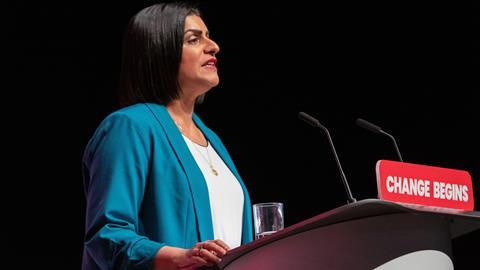The Labour Party conference has come and gone, with the only moment anyone is likely to remember being when Keir Starmer accidentally said sausages in his speech. It was not, as you might say, a banger.
The Liverpool shindig was a chance for the new administration to show what it had to offer in the justice field. Yet at times they seemed to be like a puppy trying to rouse a collapsed master. Full of good intentions and desperate to help, but not the first clue what to actually do.
At last year’s party conference, then shadow justice minister Alex Cunningham quipped: ‘We want your ideas for how to fix the system – just don’t ask for any money.’
The message presumably didn’t get through, as this year seemed to be a dearth of any proposals for how to revive the justice system.
Let’s give credit where it is due. The current justice ministers undoubtedly have their hearts in the right place. Attorney general Richard Hermer KC was one of several speakers to declare that the ‘rule of law is back’, as Labour sought to mark itself out from the previous incumbents. Hermer is a particularly impressive advocate for the justice system – a far cry from the lightweights put into the job by the Conservatives – and even got out of his chair to deliver a robust defence of human rights and the rule of law.
Lord chancellor Shabana Mahmood should be applauded not only for tackling the prisons crisis head-on in her first days (she recounted being pulled aside within minutes of taking office to be told the estate was about to collapse) but for a commitment to reducing the number of women in jail.
Justice minister Heidi Alexander listened attentively and nodded in all the right places as she heard a panel of legal aid lawyers explain in great detail how their sectors – housing, criminal, immigration, family prison law – were on their knees due to crippling under-funding. Alexander was sympathetic and clearly understood the issues, but she didn’t have a penny to commit.
Money was the elephant in the room all week, not just for justice. Mahmood probably understated the challenge she faces when she talked of ‘difficult’ conversations with the Treasury. There may be hope on this front. Hermer is known to be close to Starmer and Mahmood gained huge respect from Number 10 for the way she held onto a tricky Birmingham seat in the face of pro-Palestinian protest votes.
Money is likely to be tight for the foreseeable future, but this does not stop Labour from outlining a vision for a changed justice system. There appeared to be a dearth of imagination and creativity. The only concrete ideas we heard on justice were an extension of the legal advocates scheme for rape victims and implementation of family courts pilots announced under the Conservatives (if money could be ring-fended, noted justice minister Lord Ponsonby, pointedly).
Is this it? Is this the best that a team of passionate, experienced and highly capable legal minds can muster? We must hope that in the background, ambition remains high. But it was noticeable that in her keynote speech, Mahmood did not mention legal aid, the state of the courts, the backlog or even lawyers themselves. Could you imagine a health secretary not taking a moment to praise doctors and nurses? The suspicion remained that she said nothing on these because there is nothing of note to say.
In justice matters, this week Labour has felt like a party still in opposition. Everyone can spot the problems and assign the blame, but there was almost an acceptance that little could be done about them for now. The justice system needs more than warm words and platitudes, and we continue to wait for solutions.
































4 Readers' comments